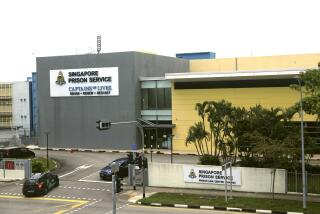Drug Traders Risk Necks to Pass Through Singapore
- Share via
SINGAPORE — As airliners begin the descent to Changi Airport, cabin loudspeakers warn passengers of “severe penalties for drug offenses in Singapore.”
To make sure the message gets across, visitors must fill out landing cards that warn in bold red letters: “Death for Drug Traffickers Under Singapore Law.”
Death by hanging is mandatory here on conviction of trading in more than half an ounce of heroin or more than an ounce of morphine. Since capital punishment for drug trafficking was introduced in 1975, 20 people, including 11 foreigners, have been hanged. The most recent execution was in January, 1986. Another 16 people have been sentenced to death and are in jail, pending appeal.
Meanwhile, the Southeast Asian country’s reputation for having one of the world’s toughest drug laws has made it an attractive transit point for traffickers on their way to Europe.
Poh Geok Ek, director of the Central Narcotics Bureau, said that many illegal traders take the risk of stopping over here in the hope that authorities at their ultimate destination will be less likely to search a passenger arriving from Singapore.
‘Golden Triangle’ Flow
Acting Health Minister Yeo Cheow Tong said that drug activities picked up last year in many countries, including Singapore, because supplies from the “Golden Triangle” (linking Thailand, Burma and Laos) have increased.
To discourage so-called “ant traffickers,” those who deal in relatively small quantities of drugs, the government last year tightened security checks at the causeway between Singapore and the Malaysian state of Johore Baru.
It also installed urinalysis machinery at all entry points to the city state. The urine tests can detect past use of heroin, opium, cocaine and marijuana. A urine sample may be demanded of any traveler, foreign or Singaporean, who seems nervous or otherwise arouses suspicion.
Authorities have also restricted the issuance of passports to Singaporeans between the ages of 20 and 30, on the theory that most addicts are in that age group.
Yeo told a public rally that 5,451 “addicts” were arrested in Singapore last year, 30% more than in 1987. “Of these, 23% were new addicts who had no previous drug record,” he said. He said the problem of drug abuse in Singapore is under control, however.
More to Read
Sign up for Essential California
The most important California stories and recommendations in your inbox every morning.
You may occasionally receive promotional content from the Los Angeles Times.













